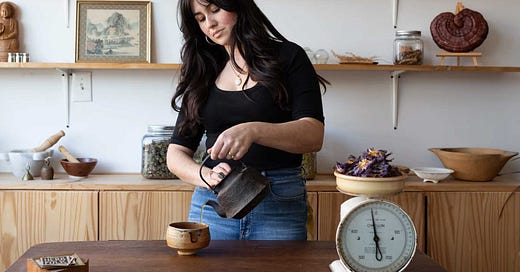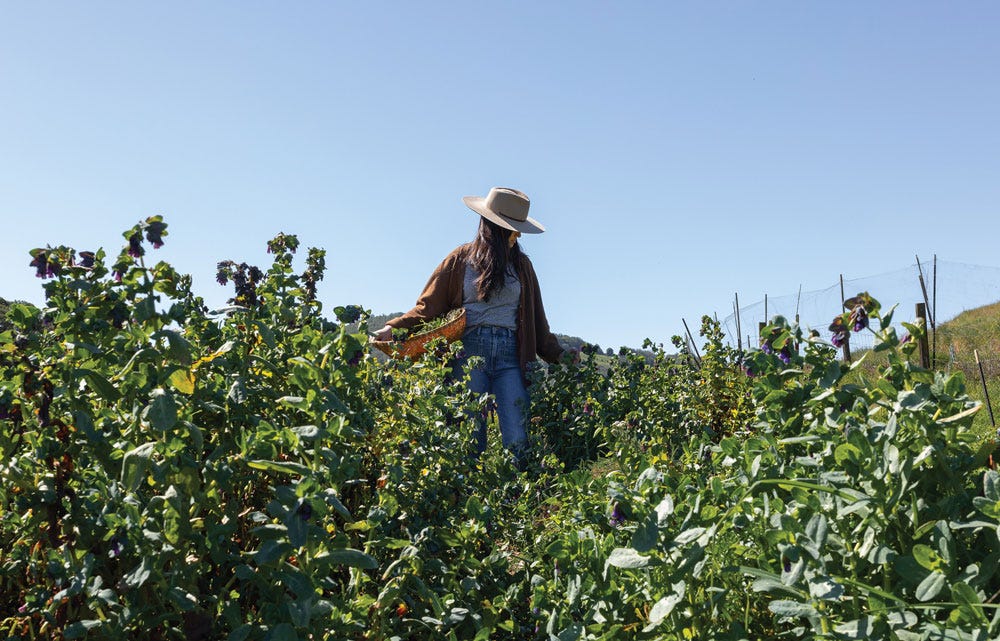When meeting with Erin Masako Wilkins, time slows down a little bit. Her creative presence is a calm respite in the busy world. She laughs easily, shares generously and listens enthusiastically.
We first became acquainted at her shop Herb Folk in downtown Petaluma — an herb and gift boutique selling scores of bulk herbs, tea supplies, and books, along with workshops in herbal medicine and her acupuncture business. She also had a zine wall.
I came into the store not only to check out the herbal offerings, but to see if she would add my zines to her stock, and while she enthusiastically accepted my zines that day, I also left with slippery elm powder and broth herbs, and we became friends over the next five years.
Last week, we met at a favorite downtown café, Stellina, and chatted about her new book Asian American Herbalism: Traditional and Modern Healing Practices for Everyday Wellness, and the challenges and excitement of life paths, herbs, business, family, and shifting identities.
“Acupuncture was life-changing for me. I felt spiritually aligned from it.”
Masako Wilkins’ path to herbalism initially began unobtrusively when a friend gifted her an acupuncture treatment.
“I thought, ‘that’s for old people’, because my grandparents did it,” she laughs. “But acupuncture was life-changing for me. I felt spiritually aligned from it.”
That first acupuncture treatment led her to eventually attend school to become an acupuncturist, and she notes that while at the time, it didn’t feel like the most logical decision, she felt called to do it anyway.
It was the first step on a path where she would learn over and over again to trust in the unfolding process and opportunities that arise, and that who we think we are can change over time.
Cultural Connections
Part of her program at school involved learning about herbs and foods as complementary medicine to acupuncture practice. “My grampa was a farm laborer and my grandparents always had a garden,” she says. “In class, I recognized some of the foods from my gramma’s kitchen: herbs; green tea; mushrooms.”
“It’s in our homes, we have a cultural connection to foods.”
She instantly resonated with herbs and food as medicine for healing. While she didn’t connect it to her heritage at the time, she came to realize that it was connected, and also that food and herbs in general are more prevalent in all our modern lives that we realize.
“It’s in our homes. We have a cultural connection to foods,” she says.
When Masako Wilkins worked as an acupuncturist, she kept a wall full of herbs to complement her clients’ treatments. When she realized herbalism was her true passion, she opened her shop Herb Folk.
“Herb Folk and my book, Asian American Herbalism, were both born from my work as an acupuncturist,” she explains. “My tea blends are based on the herbs that I most commonly recommend to patients.”
“I had a real clarity that I should work with the herbs that grow here.”
While the brick-and-mortar is now closed, Herb Folk remains as an online store where clients can still purchase her hand chosen and blended herbs, tea blends, herbal formulas, and broth herbs.
Resonant Plants
Masako Wilkins realized that the ability to use herbs was a lost body of knowledge for many people, and she wanted to change that. And she was committed to local plants.
The healing herbs in Traditional Chinese Medicine or East Asian and South Asian Herbalism are effective and potent, but incorporating the effective and potent herbs and plants that grow well here too is a passion for her.
She brings that passion to her practice and to her workshops, where one of the first things she does is to ask people to name a food they resonate with.
“I really wanted everyone to have access to herbs so I began teaching my workshops at farms, and I had a real clarity that I should work with the herbs that grow here.”
“We share a resonance with the plants here.”
There are plenty of plants that grow around us in California that offer many of the same solutions. And since they grow near us, they are the ones who know us and know what we need.
“We share a resonance with the plants here,” she affirms. “And I always ask myself how can I honor the roots of the work and ancestors and be creative?”
Her Book, Asian American Herbalism
As a practitioner of Asian American herbalism of Japanese descent, Masako Wilkins says that her heritage infuses the business and the process, and that finding the balance between traditional culture and modern culture is always a part of it.
Her book Asian American Herbalism is packed with gorgeous photographs, practical remedies, simple recipes, and inspiring information about ways to incorporate supportive plants into our lives. She says she loves the beginning of the book-writing process — the limitless potential it offers.
“The biggest lesson was a renewed sense of trusting the process.”
While herbalism treats specific ailments, it’s also about maintenance of health. Many of the herbs she shares in the book are easy to find. You can use these plants to move chi and stress out of the body.
“My book was written from my perspective as an acupuncturist and herbalist, with the intention of making traditional Chinese medicine and folk herbalism more accessible and relevant to daily life.” she explains.
Writing the book was also one of the hardest things she’s ever done.
“I thought ‘what did I get myself into?’ The book was the hardest thing I’ve ever done. And I’m a mom. It consumed my life,” she says. “I had to really dig deep, it was like writing three to four books. I didn’t know when I began what it would look like. The biggest lesson was a renewed sense of trusting the process.”
And that is at the heart of everything Masako Wilkins does — trusting her process.
“It’s about appreciation,” she smiles.






